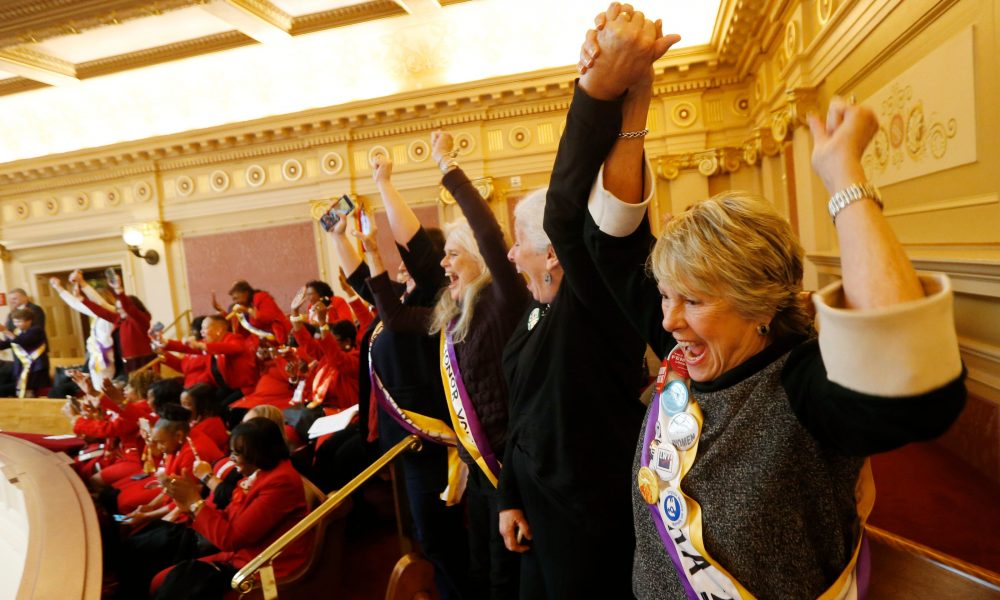Workplace discrimination
Ryan W. Miller, USA TODAY
Published 9:48 a.m. ET Jan. 30, 2020 | Updated 1:21 p.m. ET Jan. 30, 2020
CLOSE![]()
Virginia has moved to the brink of becoming the crucial 38th state to ratify the Equal Rights Amendment. The vote by both of the state’s legislative chambers Wednesday is a momentous victory for many women’s rights advocates. (Jan. 15)
AP Domestic
The attorneys general in the most recent three states to ratify the Equal Rights Amendment filed a lawsuit Thursday in an effort for the constitutional amendment to be recognized as the 28th Amendment after missing a congressional deadline.
Virginia became the 38th state to ratify the amendment this week after both houses of its Legislature voted to approve the measure. However, the move came long after the U.S. Congress set a deadline for three-fourths of states to do so by 1982.
Virginia Attorney General Mark Herring, a Democrat, announced the “landmark civil rights lawsuit” alongside Democratic Attorneys General Kwame Raoul of Illinois, which ratified the ERA in 2018, and Aaron Ford of Nevada, which ratified in 2017.
“I am so proud that Virginia was the 38th and final state needed to ratify the ERA, finally pushing us over the edge and enshrining gender equality in our nation’s founding document,” Herring said in a statement.
The lawsuit was filed Thursday in the U.S. District Court for the District of Columbia against David Ferriero, the archivist of the United States, in an effort to “compel the archivist to carry out his statutory duty of recognizing the complete and final adoption of the Equal Rights Amendment,” the lawsuit says.
The National Archives and Records Administration confirmed it received Virginia’s ratification documentation but said, “The archivist will take no action to certify the adoption of the Equal Rights Amendment,” citing legal guidance from the Justice Department.
More on the ERA: Virginia becomes 38th state to pass ERA for women, probably setting up issue for courts
The Justice Department’s Office of Legal Counsel said this month that Congress has the authority to impose a deadline and the only way to ratify the amendment is to start the process over again.
In the lawsuit, the attorneys general argue the archivist does not have “any discretion in deciding whether to publish and certify a newly adopted amendment.”
Constitutional amendments are proposed by either Congress with two-thirds approval in both the House and Senate or by a constitutional convention called for by two-thirds of states. If three-fourths, or 38, states vote to ratify, the amendment must be certified by the archivist of the United States.
In 1977, 35 states ratified the amendment, three shy of the necessary three-quarters of states. Congress extended its deadline for state approval from 1979 to 1982, but no new states ratified.
This is the first time a proposed constitutional amendment was approved by the required number of states after a deadline under the premise that it could still be ratified.
The attorneys general argue in the lawsuit that the U.S. Constitution does not set limits on the amount of time within which a proposed amendment must be ratified by states to be adopted and argue that the congressional deadline on the ERA is not binding as it was not included in the article sent to states.
The 27th Amendment, which concerns pay changes for members of Congress, took effect more than 200 years after Congress voted on it. It was certified in 1992 after 38 states ratified it.
Five states – Nebraska, Tennessee, Idaho, Kentucky and South Dakota – voted to rescind or otherwise withdraw their ratification of the ERA.
The Virginia, Nevada and Illinois attorneys general argued there is nothing in the Constitution that allows a state to rescind ratification of an amendment.
“Once a state has ratified a proposed amendment, that state has had its final say on the question,” the attorneys general said.
If officially adopted as the 28th amendment, the ERA would prohibit discrimination based on sex and explicitly declare that women have equal rights under the law.
Supporters of the ERA say these protections are needed as woman face discrimination and harassment in the workplace and elsewhere.
“It is past time that we ensure women across the country have the constitutional equality to which they are entitled,” Illinois’ Raoul said in a statement.
Nevada’s Ford said, “Women have always been endowed with equal rights, even though our country has wrongly failed to recognize them.”
Opponents say the amendment is not necessary and could enshrine in the Constitution protections for abortion.
“The ERA does nothing for true equality of women but uses women as a political pawn to push the liberal agenda,” Virginia state Sen. Amanda Chase, a Republican, said this month.
Contributing: Maureen Groppe and Ledyard King
Follow USA TODAY’s Ryan Miller on Twitter @RyanW_Miller
Autoplay
Show Thumbnails
Show Captions
Read or Share this story: https://www.usatoday.com/story/news/nation/2020/01/30/era-virginia-illinois-nevada-attorneys-general-announce-lawsuit/4618804002/
